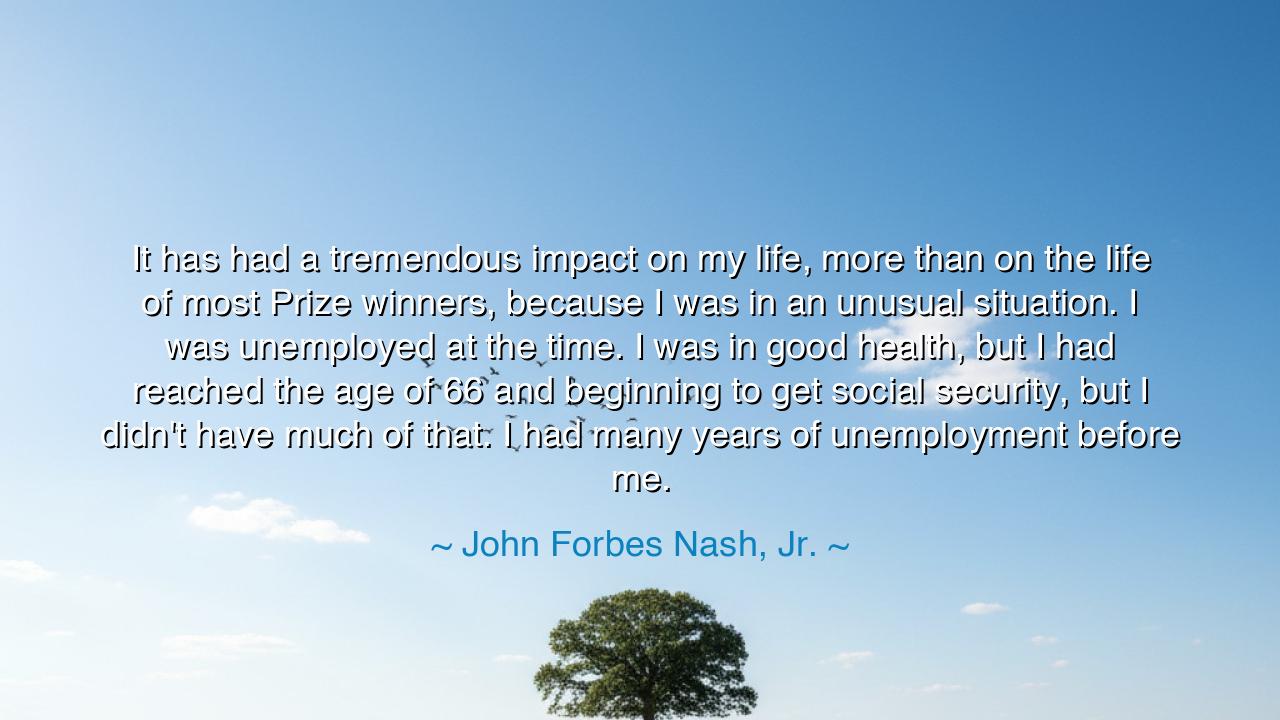
It has had a tremendous impact on my life, more than on the life
It has had a tremendous impact on my life, more than on the life of most Prize winners, because I was in an unusual situation. I was unemployed at the time. I was in good health, but I had reached the age of 66 and beginning to get social security, but I didn't have much of that. I had many years of unemployment before me.






When John Forbes Nash, Jr., the brilliant yet tormented mathematician, said, “It has had a tremendous impact on my life, more than on the life of most Prize winners, because I was in an unusual situation. I was unemployed at the time. I was in good health, but I had reached the age of 66 and beginning to get social security, but I didn't have much of that. I had many years of unemployment before me,” he was not boasting of his Nobel Prize but confessing the strange irony of fate. In his words lies a meditation on human destiny — how greatness may come late, how genius may suffer long in silence, and how even triumph can be shadowed by hardship. His voice, humble and reflective, is that of a man who had wrestled with both madness and obscurity, and who, through endurance, rediscovered not only recognition but peace.
To understand these words, one must first remember the path from which they arose. John Nash was not an ordinary scholar; he was a man whose mind reshaped the very structure of human reasoning. His work in game theory, once ignored, would become the foundation of modern economics, politics, and social science. Yet, for decades, his brilliance was obscured by the fog of mental illness. He wandered through the margins of life, forgotten by the institutions that once celebrated him, unemployed, dismissed, even pitied. Thus, when the Nobel Prize came in 1994, it arrived not to crown a career of steady triumph, but to resurrect a life thought lost. For Nash, the honor was not a continuation of success — it was a miracle born out of ruin.
The "tremendous impact" he speaks of, then, is not the vanity of fame, but the salvation of meaning. Most laureates receive the Prize as an ornament upon a long life of recognition; for Nash, it was the return of dignity after years of exile. His words reveal the fragile balance between brilliance and survival. He was 66, standing between past hardship and the dim unknown, when the world suddenly turned its gaze toward him again. The Prize was more than money, more than prestige — it was the restoration of purpose. For a man who had been cast adrift in the wilderness of the mind, this acknowledgment was light breaking through the long night.
There is something ancient in his story, reminiscent of the prophets and philosophers of old — those who suffered rejection before their truth was understood. Galileo, condemned for his discoveries, Van Gogh, impoverished and ignored, Socrates, executed for his ideas — each bore the weight of vision unrecognized. Nash joined this lineage of misunderstood souls who waited decades for the world to hear them. His humility in the face of belated recognition reminds us that glory delayed is not glory denied, and that even in isolation, one’s work may still ripple across the centuries.
And yet, Nash’s reflection carries a somber tone. He does not speak as one intoxicated by success, but as one aware of time’s limits. “I had reached the age of 66,” he says, as if to remind us that recognition, though sweet, cannot restore lost years. The shadow of mortality lingers behind his words. He had outlived despair, but he could not reclaim the decades consumed by it. His gratitude is tempered by awareness — that fame cannot replace the ordinary joys of living, nor can it erase the pain endured in the waiting. Still, his calm acceptance is a lesson in itself: that even after long desolation, the spirit can be renewed, and the final chapters of life can yet bring redemption.
From Nash’s experience emerges a truth that every generation must hear: the measure of a life is not its smoothness, but its perseverance. The storms that break the body need not break the soul. To endure, to continue one’s inner work in the face of invisibility, is the highest act of faith. For decades, Nash labored in silence, guided by a belief that his mind, however tormented, was still capable of beauty. His story teaches that one must never surrender to despair, for destiny moves slowly, but with purpose. Sometimes, what is denied in youth is granted in age, and what seems like loss becomes the ground of wisdom.
So, O seeker of purpose, take this lesson to heart: do not measure your worth by the moment’s applause. The recognition of the world comes and goes, but the value of honest work endures. If you labor in obscurity, do so with the faith that time will one day uncover what is hidden. If you stumble through hardship, remember that even the broken vessel can still carry divine light. And if success comes late, greet it not with pride, but with gratitude — for life has found a way to balance its scales in its own time.
Thus, the wisdom endures: true greatness is not found in the prize, but in the perseverance that makes it possible. The world may forget for a season, but truth never remains buried forever. Like John Nash, who rose from silence to immortality, let each of us strive to endure the long night of struggle — knowing that even if our reward comes late, it may yet arrive precisely when the spirit is ready to receive it.






AAdministratorAdministrator
Welcome, honored guests. Please leave a comment, we will respond soon